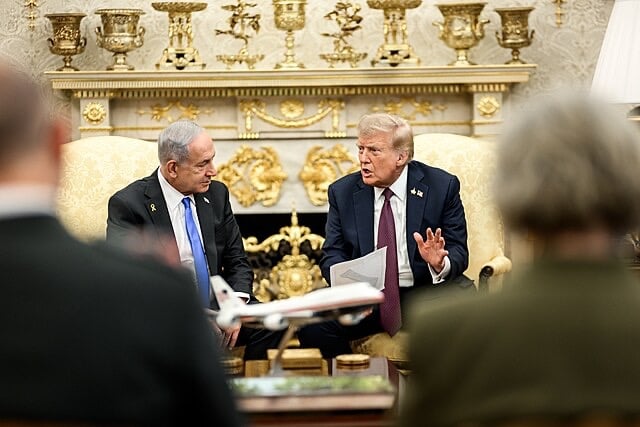Trump’s Return to Clarity: Peace in the Desert
Trump’s foreign policy, often derided as transactional, now appears visionary. He understood that peace is not born from speeches or moral appeals, but from power, discipline, and a willingness to confront uncomfortable truths.
COMMENTARIES
Asanga Abeyagoonasekera
10/14/2025


Pic: WikiMediCommons: President Donald Trump and Israeli Prime Minister Benjamin Netanyahu review the U.S. peace plan for Gaza, Monday, September 29, 2025, during a bilateral meeting in the Oval Office. (Official White House Photo by Daniel Torok)
In the heart of the Middle East, where centuries of conflict have turned faith and land into instruments of despair, a rare quiet has descended. The guns in Gaza have fallen silent. Hostages have come home. Prisoners walk free under a cautious sun. For a moment, history pauses—perhaps in disbelief.
The world now calls it the Trump Peace Plan. Late on October 9, Israel’s cabinet approved a ceasefire with Hamas, an agreement that set in motion the first real steps toward ending a two-year war that had consumed tens of thousands of lives. For years, peace in Gaza existed only as rhetoric—an illusion sustained by diplomats and think-tank formulas. Then came a man who, for all his flaws, speaks the language of action, not apology.
Donald Trump did what generations of professional statesmen could not: he turned the impossible into the inevitable.
While the Biden administration drifted in confusion—its foreign policy an exercise in hesitation and moral posturing—Trump returned with clarity and conviction. He unveiled a twenty-point peace plan that forced movement on all sides. The result: hostages released, Israeli troops withdrawn, and a roadmap for Gaza’s demilitarization that no one else dared attempt.
Critics once mocked his blunt speech and rejection of global orthodoxy. Yet they now confront an undeniable truth—it worked.
The Language of Reality
Under President Biden, America’s foreign policy became a philosophy of avoidance. Afghanistan was its symbol—a retreat executed in chaos and humiliation. Across the globe, America’s allies watched a superpower turn uncertain, reluctant to lead, fearful of risk.
Trump’s approach to peace emerged from confrontation with reality, not retreat from it. His plan is demanding, even harsh—calling for accountability from both Israel and Hamas, demilitarization, and transitional governance under international oversight. Yet it is precisely this toughness that gives it credibility. Peace endures only when it is built on the foundation of truth, not illusion.
Under Trump’s direction, six hundred trucks of aid now cross daily into Gaza. An International Stabilization Force—led by the United States and supported by Arab partners—is taking shape to oversee the transition from war to governance. He promised no utopia, only order. And in a region long addicted to chaos, order itself is revolutionary.
The Sharm el-Sheikh Moment
Now, all eyes turn to Sharm el-Sheikh. For the first time, it will not be ministers or envoys gathering under the desert sun, but heads of state themselves. Presidents and prime ministers—those who hold the weight of nations—will meet in a dialogue orchestrated by Trump himself.
The symbolism matters. This is not another photo opportunity wrapped in diplomatic ceremony. It is the architecture of a new conversation, one that bypasses bureaucratic fatigue and speaks directly to leadership and responsibility. In a fractured region, where too many summits have produced too little, the Sharm el-Sheikh meeting marks a profound difference: the dialogue begins at the top, with those who can decide and act.
Trump understands the power of that stagecraft—the fusion of presence and authority. The meeting will not just shape policy; it will reshape perception.
The End of Naïve Idealism
The Biden years have been marked by confusion disguised as compassion. Words replaced deeds; empathy became an excuse for inaction. From Ukraine to the Indo-Pacific, America’s allies began to doubt her resolve. The Middle East, too, lost faith in Washington’s capacity to lead.
Trump’s foreign policy, often derided as transactional, now appears visionary. He understood that peace is not born from speeches or moral appeals, but from power, discipline, and a willingness to confront uncomfortable truths.
When Trump declared before the Israeli Knesset that the war had ended, he spoke not only to Israelis and Palestinians but to a world weary of cynicism. The statement was bold, perhaps premature—but it signaled intent, and intent matters. It reminded nations that leadership still exists, that America can still decide.
The Desert Awakens
The ceasefire remains fragile; the path ahead uncertain. But something has changed. Prime Minister Benjamin Netanyahu called the deal the “opening of a historic expansion of peace.” Even Hamas, through its usual defiance, seems uncertain how to respond to calm after so much blood.
Trump’s plan does not promise a Palestinian state tomorrow; it promises the conditions under which such a state could one day exist. It recognizes that peace is not an event but a process—a gradual emergence from trauma toward coexistence.
The plan demands demilitarization, the rebuilding of Gaza’s institutions, and a new technocratic leadership insulated from the corruption and violence that have long defined Palestinian politics. It establishes an international board—headed by Trump himself and joined by former British Prime Minister Tony Blair—to guide Gaza’s redevelopment and reform.
It is not idealism. It is realism tempered by experience, and perhaps by something rarer in modern politics: resolve.
A Return to the Real
America under Trump remembers itself—not as an empire of apologies but as a nation capable of shaping history. Under Biden, the country learned what decay looks like: hesitation dressed as diplomacy, sympathy without strategy.
The Trump years, with all their turbulence, offered something simpler and far rarer—the will to decide. Whether in the Abraham Accords, North Korea talks, or now Gaza, Trump’s instinct for negotiation rests on strength, not submission. He has shown that moral clarity and strategic firmness are not opposites but allies.
The peace taking shape in Gaza is imperfect, fragile, and incomplete. Yet it exists—and that is more than can be said of the empty promises and moral lectures of recent years.
In the quiet streets of Gaza City, where families return from exile, there is no need for theories about diplomacy or power. There is only the fragile recognition that peace, like all human achievement, belongs not to those who merely imagine it, but to those who act.
Trump acted. And for the first time in years, the world seems to move again.
About the Author: Asanga Abeyagoonasekera is Executive Director of the South Asia Foresight Network (SAFN) at the Millennium Project in Washington, D.C., and author of Teardrop Diplomacy (Bloomsbury, 2023).


